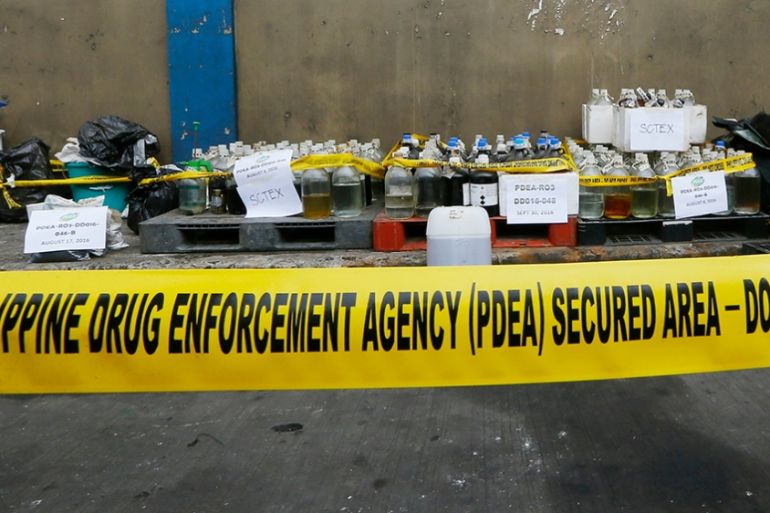Duterte’s war on drugs to become ‘killing field’ if goes on: CHR
Philippines’ Commission on Human Rights urges government to follow ‘due process’ with suspects instead of shooting them.

Marrakech, Morocco – Rodrigo Duterte‘s war on drugs will lead to a “killing field” if the Philippines president is allowed to continue his crackdown, the country’s Commission on Human Rights (CHR) has warned.
While officials have put the death figure close to 5,000 since Duterte came to office in 2016, rights groups and opposition politicians say more than 20,000 people have been killed by police.
Keep reading
list of 4 itemsPhilippine human rights campaigner granted bail
Families urge Philippines to work with ICC on ‘drug war’ probe
Philippine police officer jailed for killing teens in ‘drug war’
“We are questioning the very framework of this war on drugs and the intention behind it,” Gwendolyn Pimentel-Gana, commissioner of the CHR, told Al Jazeera on the sidelines of an intergovernmental conference in Marrakech, Morocco.
“You just can’t kill everyone. One life is one too many already. If it continues like this, it will become a killing field. When the president came into power, he said this crackdown would be over in six months. Later, he said it will continue throughout his term.”
One particularly affected province is Cebu, where residents remain worried as the drug-related killings continue and police say they will be relentless in trying to achieve the president’s mission.
“The police have to fight back. There will be collateral damage and even the innocent people will be victims,” said Royina Garma, Cebu city police director.
The CHR is demanding authorities undertake “due process” when dealing with the suspects instead of shooting them dead.
“The suspects should be arrested and taken through a legal process and not killed,” Pimentel-Gana said.
“That’s why there needs to be a paradigm shift on the government’s part and it needs to change its perspective on this war on drugs.”
Earlier this year, the International Criminal Court (ICC) launched an investigation into Duterte’s war on drugs, opening a “preliminary examination” into the deaths to determine if the gravity of the crimes fall under its jurisdiction.
Duterte immediately announced his country’s withdrawal from The Hague-based court, saying it “has no jurisdiction nor will it acquire jurisdiction” over him.
In August, activists and families of eight victims filed a complaint with the ICC, calling for his indictment over thousands of extrajudicial killings, filing a complaint with the ICC.
The following month, Duterte appeared to take responsibility for the killings, saying “my only sin is extrajudicial killings”.
“Duterte’s statement should come as no surprise to anyone who has followed his career. But it should spur efforts domestically and internationally to ensure he is indeed held to account for the ‘drug war’ deaths he has instigated and incited,” Phelim Kine, deputy director of Human Rights Watch’s Asia division, said in a statement at the time.
The CHR, meanwhile, is vowing to keep “talking and pushing” in order to protect Filipinos’ human rights in their own country.
“We are fighting for human rights and every Filipino must realise he or she has basic human rights and that dignity of life is very important. We need to educate people and advocate the cause,” said Pimentel-Gana.